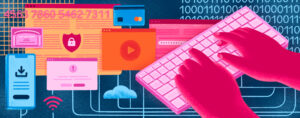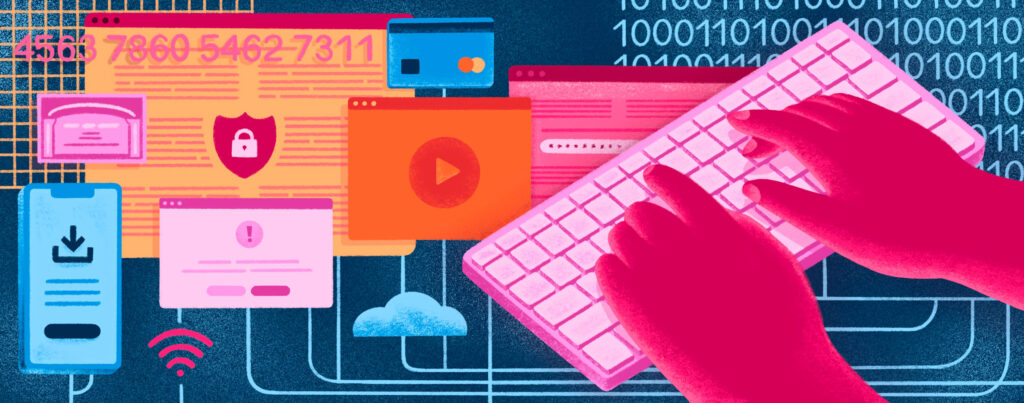Protect Yourself From Fraud
At First National Bank, the financial security of our customers is a top priority.
We are constantly working to keep your accounts and information secure.
We have provided knowledge-based guidance to assist you with safeguarding your information.
REMEMBER: FIRST NATIONAL BANK WILL NEVER CALL OR TEXT YOU TO ASK FOR YOUR BANK ACCOUNT OR PERSONAL INFORMATION.
What to Do if Your Debit Card Is Compromised
The security of your account is our top priority at First National Bank. To report a lost or stolen debit card, please call 800-472-3272. Please notify the bank as soon as you realize your card is lost or stolen.
Remember: First National Bank will never ask you for personal or financial information – like password, Identification (ID), or account numbers – through unsolicited emails or pop-up windows.
Consumer Tips: To avoid becoming a victim of debit card fraud, follow these tips from the American Bankers Association:
- Immediately notify your bank if your card is lost or stolen.
- If you have a reason to suspect fraud, check your account balance right away by calling the bank, or visiting your account online or through a mobile app.
- Keep your receipts to check against your statement.
- Keep a record of card numbers, expiration dates and 1-800 numbers for banks so you can contact the issuing bank easily in cases of theft.
- Mark through any blank spaces on debit receipts, including the tip line at restaurants, so the total amount cannot be changed.
- Know your limits. Many issuers limit daily purchases and withdrawals for your protection.
- Be wary of those trying to help you, They may be trying to steal your card number and PIN.
- Do not give your PIN number to anyone over the phone. Thieves often steal cards and then call the victims for their PIN, claiming to be law enforcement or the issuing bank.
- Always take your receipts or transaction records with you.
- Do not leave your card lying around the house or on your desk at work. No one should have access to the card but you.
- Check your bank statements often. Report unauthorized transactions immediately.

For more tips on protecting yourself online, CLICK HERE to read “Protect Yourself Online” article in our financial literacy library.
Identity Theft Tips and Resources
Identity theft occurs when someone assumes your identity to perform fraud or other criminal acts. Criminals can get the information they need to assume your identity from a variety of sources, including stealing your wallet, going through your trash or by compromising your bank information. You may be approached in person, by telephone or through the internet.
First National Bank will never ask you for personal or financial information – like password, ID, account numbers – through unsolicited emails or pop-up windows.
Consumer Tips
To avoid becoming a victim of Identity Theft, follow these tips from the American Bankers Association:
- Don’t give your Social Security number or other personal credit information about yourself to anyone who contacts you.
- Tear up receipts, bank statements and unused credit card offers before throwing them away.
- Keep an eye out for any missing mail.
- Review your monthly accounts regularly for any unauthorized charges through the Internet, phone or ATM statements.
- Choose to do business with companies you know are reputable, particularly online. When conducting business online, make sure your browser’s padlock or key icon is active, indicating a secure transaction.
- Order copies of your credit report at least once a year to ensure accuracy.
- Never give out personal financial information in an email or over the phone unless you have initiated the contact.
- When using social networking sites, never include personal contact information including birth date, email addresses, physical address, mother’s maiden name or other information that could provide sensitive information to fraudsters or hints to passwords.
- Don’t open email from unknown sources and use virus detection software.
- Protect your PINs (don’t carry them in your wallet!) and passwords; use a combination of letters and numbers for your passwords and change them periodically.
Notifying Credit Bureaus
If you believe you have been a victim of identity theft, it’s recommended that you contact the three national consumer reporting agencies and have them place a “fraud alert” on your credit report.
Equifax – 1-800-525-6285
P.O. Box 740241
Atlanta GA 30347-0241
www.equifax.com
Experian – 1-888-397-3742
P.O. Box 9530
Allen TX 75013
www.experian.com
TransUnion – 1-800-680-7289
Fraud Victim Assistance Division
P.O. Box 6790
Fullerton CA 92634-6790
www.transunion.com
Additionally, you can request a free annual credit report from each of the three credit reporting agencies whether or not you suspect fraud. Most fraud victims do not know they are victims of identity theft for an extended period of time. The longer the fraud occurs, the larger the risk of loss and the more time it takes to clear up the fraud.

For more tips on protecting your identity, CLICK HERE to read “Preventing Identitiy Theft” article in our financial literacy library.
Financial Elder Abuse
Elder financial exploitation robs victims of their resources, dignity and quality of life—and they may never recover from it. Anyone who sees signs of theft, fraud, misuse of a person’s assets or credit, or use of undue influence to gain control of an older person’s money or property should be on the alert. Those are signs of possible exploitation. Older Americans that may have disabilities or rely on others for help can be susceptible to scams and other fraud. Advances in technology can also make it difficult for seniors to know who to trust and what’s safe.
Abusers can be anyone—family members, caregivers, friends, neighbors or complete strangers. Keys to spotting financial abuse is a change in a person’s financial patterns.
Watch Out for These Red Flags
- Frequent or unexplained withdrawals that are inconsistent for the elder’s normal behavior
- Withdrawals from bank accounts or transfers between accounts the customer cannot explain
- A new “best friend” accompanying an older person to the bank
- Sudden non-sufficient fund activity or unpaid bills
- Closing CDs or accounts without regard to penalties
- Uncharacteristic attempts to wire large sums of money
- Suspicious signatures on checks or outright forgery
- Confusion, fear or lack of awareness on the part of an older customer
- Checks written as “loans” or “gifts”
- Bank statements that no longer go to the customer’s home
- New powers of attorney the older person does not understand
- A caretaker, relative or friend who suddenly begins conducting financial transactions on behalf of an older person without proper documentation
- Altered wills and trusts
If you suspect any of the above, you should report abuse to your local Department of Social Services in the county where the disabled adult lives.

For more tips on financial elder abuse, CLICK HERE to read “Scams Targeting Seniors” article in our financial literacy library.
What to Do if Your Business Email Is Compromised
Business Email Compromise (BEC) is defined as a sophisticated scam targeting businesses working with foreign suppliers and/or businesses that regularly perform wire transfer payments. The scam is carried out by compromising legitimate business e-mail accounts through social engineering or computer intrusion techniques to conduct unauthorized transfers of funds.
Most victims report using wire transfers as a common method of transferring funds for business purposes; however, some victims report using checks as a common method of payment. The fraudsters will use the method most commonly associated with their victim’s normal business practices.
How to avoid becoming a victim of a BEC scam
First and foremost – be alert! If something feels “off” about an email asking to wire money, listen to your gut and follow up with the person who’s (supposedly) asking for the wire transfer in person or via phone to confirm the request.
It’s best to establish a specific process for wire transfers within your company – especially if it’s a large amount. The FBI urges businesses to adopt two-step or two-factor authentication for email, where available, or to establish other communication channels — such as telephone calls — to verify significant transactions. In other words, a wire transfer could not occur until it has been confirmed using a second method of communication.
It’s also important to be aware of information you are posting about your business online. Attackers perpetrating these schemes often will try to discover information about when executives at the targeted organization will be traveling or otherwise out of the office through social media platforms.
What to do if you are a victim
If funds are transferred to a fraudulent account, it is important to act quickly:
- Contact First National Bank immediately upon discovering the fraudulent transfer.
- Request that First National Bank contact the corresponding financial institution where the fraudulent transfer was sent.
- Contact your local Federal Bureau of Investigation (FBI) office if the wire is recent. The FBI, working with the United States Department of Treasury Financial Crimes Enforcement Network, might be able to help return or freeze the funds.
- File a complaint, regardless of dollar loss, with www.IC3.gov.

For more tips on recognizing email scams and other scams, CLICK HERE to read “Recognizing and Avoiding Scams” article in our financial literacy library.
Mail and Check Fraud
The most common occurrence is business checks being altered after being stolen from the mail or fraudsters making a counterfeit check with the same account information on it. A business’ cash flow can be greatly affected after falling victim to mail fraud so it is important to closely monitor your business’ accounts.
To avoid being a victim to mail and check fraud, keep these tips in mind:
- Monitor your accounts closely so you can identify if an original item did not clear or if it’s payable to a different payee (which could be the result of an altered check.) Don’t wait for a vendor to reach out and say they didn’t receive payment.
- Don’t mail checks from your business location or by using the outdoor blue collection boxes. Instead, mail them from inside the post office.
- If your vendor tells you that they did not receive payment, but you can see the check has cleared your account, contact the bank as soon as possible to start an Affidavit of Alteration or Other Fraudulent Act form. These claims must be sent to the bank that negotiated the check and can take some time to get a response.
- If your company issues a large number of checks, you may want to talk to your bank about what fraud prevention tools are available.
Scam Checker
Use the Scam Checker Coach below provided by Banzai to help determine if a request or offer you receive could be a scam.
Financial Literacy Seminar Request
FNB offers in-person seminars for all ages. Please let us know if your organization is interested in hosting a seminar by completing the form.
In-Person Financial Literacy Seminar Request
FNB offers in-person seminars for all ages. Please let us know if your organization is interested in hosting a seminar.


